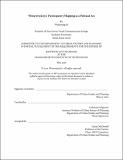| dc.contributor.advisor | Catherine D'Ignazio. | en_US |
| dc.contributor.author | So, Wonyoung. | en_US |
| dc.contributor.other | Massachusetts Institute of Technology. Department of Urban Studies and Planning. | en_US |
| dc.date.accessioned | 2020-09-15T22:06:57Z | |
| dc.date.available | 2020-09-15T22:06:57Z | |
| dc.date.copyright | 2020 | en_US |
| dc.date.issued | 2020 | en_US |
| dc.identifier.uri | https://hdl.handle.net/1721.1/127628 | |
| dc.description | Thesis: M.C.P., Massachusetts Institute of Technology, Department of Urban Studies and Planning, May, 2020 | en_US |
| dc.description | Cataloged from the official PDF of thesis. | en_US |
| dc.description | Includes bibliographical references (pages 88-92). | en_US |
| dc.description.abstract | Participatory GIS (PGIS) and crowdsourced mapping have allowed communities to envision ways in which marginalized populations can hold governments accountable and demand urban change. Yet, those participatory practices have been criticized that the participatory methods are used to legitimize the desires of a strong governmental entity and they are veneered to be used as a rhetorical device for democratic outputs. The question here is to figure out how a participatory map refuses to compromise with the current government structure and can work as a counter hegemonic entity. To address such problems, this thesis shows the development process of Wesurvived.nyc, an online participatory mapping platform that documents neighborhood change in New York City through the memories and stories uploaded by residents. The platform provides an opportunity for responding to neighborhood change while simultaneously documenting small businesses and community spaces, many of which are struggling with rising rents and shifting demographics. Using the datasets already present in Google Street View and OpenStreetMap Point of Interests (POIs), this platform aims to be a place where those who live and/or work in New York City can document and share stories about beloved neighborhood spaces that have closed or are on the edge of closing. The Wesurvived.nyc mapping tool demonstrates ways in which the voices of marginalized populations can co-exist with quantitative information through workshops organized with community-based institutions and grassroots activist groups, as well as one-on-one remote conferencing sessions. | en_US |
| dc.description.statementofresponsibility | by Wonyoung So. | en_US |
| dc.format.extent | 92 pages | en_US |
| dc.language.iso | eng | en_US |
| dc.publisher | Massachusetts Institute of Technology | en_US |
| dc.rights | MIT theses may be protected by copyright. Please reuse MIT thesis content according to the MIT Libraries Permissions Policy, which is available through the URL provided. | en_US |
| dc.rights.uri | http://dspace.mit.edu/handle/1721.1/7582 | en_US |
| dc.subject | Urban Studies and Planning. | en_US |
| dc.title | Wesurvived.nyc : participatory mapping as a political act | en_US |
| dc.title.alternative | Participatory mapping as a political act | en_US |
| dc.type | Thesis | en_US |
| dc.description.degree | M.C.P. | en_US |
| dc.contributor.department | Massachusetts Institute of Technology. Department of Urban Studies and Planning | en_US |
| dc.identifier.oclc | 1193560982 | en_US |
| dc.description.collection | M.C.P. Massachusetts Institute of Technology, Department of Urban Studies and Planning | en_US |
| dspace.imported | 2020-09-15T22:06:57Z | en_US |
| mit.thesis.degree | Master | en_US |
| mit.thesis.department | UrbStud | en_US |
